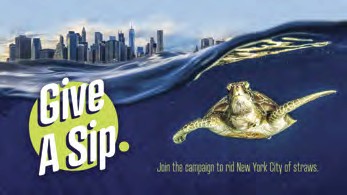By John Delaney
 The Wildlife Conservation Society (WCS) kicked off its Give a Sip campaign in May to support a bill introduced by Councilman Rafael Espinal that will eliminate the use of most single-use plastic straws in New York, NY. Give a Sip asks New York City consumers, restaurants and businesses to support the legislation to stop using single-use plastic straws, which contribute to plastic pollution that harms a wide array of marine wildlife from whales to sea turtles.
The Wildlife Conservation Society (WCS) kicked off its Give a Sip campaign in May to support a bill introduced by Councilman Rafael Espinal that will eliminate the use of most single-use plastic straws in New York, NY. Give a Sip asks New York City consumers, restaurants and businesses to support the legislation to stop using single-use plastic straws, which contribute to plastic pollution that harms a wide array of marine wildlife from whales to sea turtles.
The legislation prevents food service establishments in New York City from offering consumers single-use beverage straws or stirrers made of plastic or other non-biodegradable material. It would still allow food service establishments to offer biodegradable and reusable straws to consumers. It also includes exemptions that allow food service establishments to continue to offer appropriate straws for people with disabilities or medical conditions. Since this law will take effect 180 days after passage, it allows time for and consumers to be educated on the issue and food service establishments to prepare to make appropriate changes.
“It’s no secret that we have a plastic problem,” said Councilman Espinal. “It is estimated that there are 13 million metric tons of plastic clogging our oceans and that 100,000 marine creatures die from plastic entanglement a year. But, there is something we can do about this trend and it could be as simple as changing how you drink your iced coffee in the morning or your cocktail at night. With so many options available from paper to metal straws, we can make plastic a thing of the past. That is why I am proud to introduce legislation which would virtually eliminate plastic straws from New York City venues, bars and restaurants.”
“A single straw may seem like nothing. It’s not,” said John Calvelli, WCS Executive Vice President of Public Affairs. “Tons of plastic enter oceans around the world each year. New York can help lead the way by saying no to plastic straws. Since they can’t be recycled, single-use plastic straws are among the main offenders. Plastic pollution in our city is deadly for local turtles, fish, and birds. They can’t help getting tangled in it or mistaking it for food. Join us and let’s make a difference together.” WCS, which runs the Bronx Zoo, New York Aquarium, Central Park Zoo, Prospect Park Zoo, and Queens Zoo, has already eliminated plastic straws from all of its parks.
“As a native New Yorker, I know that this city can create a wave of change for clean seas…throughout all five boroughs,” said Adrian Grenier, co-founder of Lonely Whale, which produced the Strawless In Seattle campaign. “I hope the people of New York will join WCS and Lonely Whale and commit to #StopSucking by supporting the Give A Sip campaign. Together, our small commitments on behalf of our ocean have the power to drive a massive impact.”
In addition, The Oceanic Global Foundation has been instrumental in supporting the campaign, having recruited a robust list of New York’s leading venues to back the bill. Oceanic Global has on-boarded partners through providing them with the Oceanic Standard tool-kit, a comprehensive guide to implementing sustainable practices in the hospitality industry, on both the consumer-facing side and in back-of-house activity.
“We’re thrilled to support WCS and Rafael Espinal in driving legislation to ban the use of plastic straws in New York,” said Lea d’Auriol founder of Oceanic Global. “We view eliminating plastic straws as the ‘gateway’ step for businesses and consumers to implementing sustainability on larger scale. Our hope is that through taking this initial action, New York will continue to move towards a greener future, and inspire other global cities to follow its lead.”
Plastic straws are among the most common litter items found on our beaches and in the world’s oceans. Sixty to 80 percent of all marine debris is composed of plastic; 260-plus species have ingested or been entangled by plastic debris. Plastic straws cannot be recycled, so they either end up in a landfill or as litter where they eventually wind up in the ocean. Alternatives such as paper, bamboo, metal, or glass straws are readily available – or consumers can simply skip using straws altogether.
Plastic’s effect on marine life is staggering: An estimated 71 percent of seabirds and 30 percent of sea turtles have been found with plastic in their stomachs. When an animal ingests plastic, it’s often fatal. In the ocean, plastic straws break down into “microplastics” where they can enter the food chain and wind up on our plates. At the rate the world is polluting, experts say there will be more plastic in the ocean by weight than fish by 2050. To support the legislation, learn more, and download a toolkit, go to giveasip.nyc. ■
John Delaney is an Assistant Director of Communications at the Wildlife Conservation Society.



